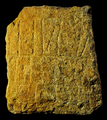TI·29 Aranno: Difference between revisions
No edit summary |
No edit summary |
||
| Line 26: | Line 26: | ||
Images in {{bib|Mommsen 1853}}: Taf. I.5d (drawings by Pelli = {{bib|CII}}: tab. I.1D), {{bib|CII}}: tab. LVIII.1D (drawing of a cast by Baserga = {{bib|Pauli 1885}}: Taf. I.1d), | Images in {{bib|Mommsen 1853}}: Taf. I.5d (drawings by Pelli = {{bib|CII}}: tab. I.1D), {{bib|CII}}: tab. LVIII.1D (drawing of a cast by Baserga = {{bib|Pauli 1885}}: Taf. I.1d), | ||
Found in March 1841 a quarter of a mile from Aranno near the old street which leads from there via the Monte d'Iseo to Neggio, on the property of one Vittore Corti, at a depth of somewhat over half a metre, together with three other stone fragments. According to the first owner of the finds, Vittore Pelli from Aranno, they are the remains of a grave chamber, destroyed by the finders. The four fragments from Aranno were thus originally thought to be parts of the same stela despite not fitting together ({{bib|Mommsen 1853}}: 202 f., no. 5) | Found in March 1841 a quarter of a mile from Aranno near the old street which leads from there via the Monte d'Iseo to Neggio, on the property of one Vittore Corti, at a depth of somewhat over half a metre, together with three other stone fragments. According to the first owner of the finds, Vittore Pelli from Aranno, they are the remains of a grave chamber, destroyed by the finders. The four fragments from Aranno were thus originally thought to be parts of the same stela despite not fitting together ({{bib|Mommsen 1853}}: 202 f., no. 5). {{bib|Rhŷs 1913}}: 23 determined them to belong to at least two stones, {{bib|Tibiletti Bruno 1965}} (also {{bib|Tibiletti Bruno 1965|1968c}}: 356) to be fragments of four different stelae which had been reused for the Aranno tomb. Originally built into a wall of Pelli's house. | ||
{{bibliography}} | {{bibliography}} | ||
Revision as of 15:02, 7 October 2023
| Object | |
|---|---|
| Classification: | unidentifiable |
|
| |
| Material: | stone |
| Material composition: | mica schist |
| Size: | |
| Extension (h×w×d): | 45 cm17.717 in <br /> × 38 cm14.961 in <br /> × 8.5 cm3.346 in <br /> |
| Condition: | fragmentary |
|
| |
| Archaeological culture: | unknown |
| Date: | 4th century BC |
|
| |
| Site: | Aranno (Ticino, Switzerland) |
| Archaeological context: | over a tomb |
| Coordinates (approx.): | 46° 1' 1.20" N, 8° 52' 1.20" E [from site] |
| Find date: | 1841 (Motta) or 1842 (Morandi) |
| Current location: | Museo del Malcantone (Curio) |
| Inventory no.: | 6.1818.1 |
|
| |
| Inscription: | TI·29 (]ạniui:p?[/]ḳionei:p[/]????[) |
|
| |
| Alternative sigla: | Whatmough 1933 (PID): 272 a Solinas 1995: 1 A Motta 2000: 8 a Morandi 2004: 27 |
|
| |
| Sources: | Morandi 2004: 534 Motta 2000: 202-203 Solinas 1995: 319-320 |
Images
Commentary
Images in Mommsen 1853: Taf. I.5d (drawings by Pelli = CII: tab. I.1D), CII: tab. LVIII.1D (drawing of a cast by Baserga = Pauli 1885: Taf. I.1d),
Found in March 1841 a quarter of a mile from Aranno near the old street which leads from there via the Monte d'Iseo to Neggio, on the property of one Vittore Corti, at a depth of somewhat over half a metre, together with three other stone fragments. According to the first owner of the finds, Vittore Pelli from Aranno, they are the remains of a grave chamber, destroyed by the finders. The four fragments from Aranno were thus originally thought to be parts of the same stela despite not fitting together (Mommsen 1853: 202 f., no. 5). Rhŷs 1913: 23 determined them to belong to at least two stones, Tibiletti Bruno 1965 (also 1968c: 356) to be fragments of four different stelae which had been reused for the Aranno tomb. Originally built into a wall of Pelli's house.
Bibliography
| CII | Ariodante Fabretti, Corpus inscriptionum italicarum antiquioris aevi. Ordine geographico digestum et glossarium italicum, in quo omnia vocabula continentur ex umbricis, sabinis, oscis, volscis, etruscis aliisque monumentis quae supersunt, Augusta Taurinorum: 1867. |
|---|---|
| Crivelli 1940 | Aldo Crivelli, "La iscrizione nord-etruscha di Aranno", Rivista Storica Ticinese 3 (1940), 333. |
